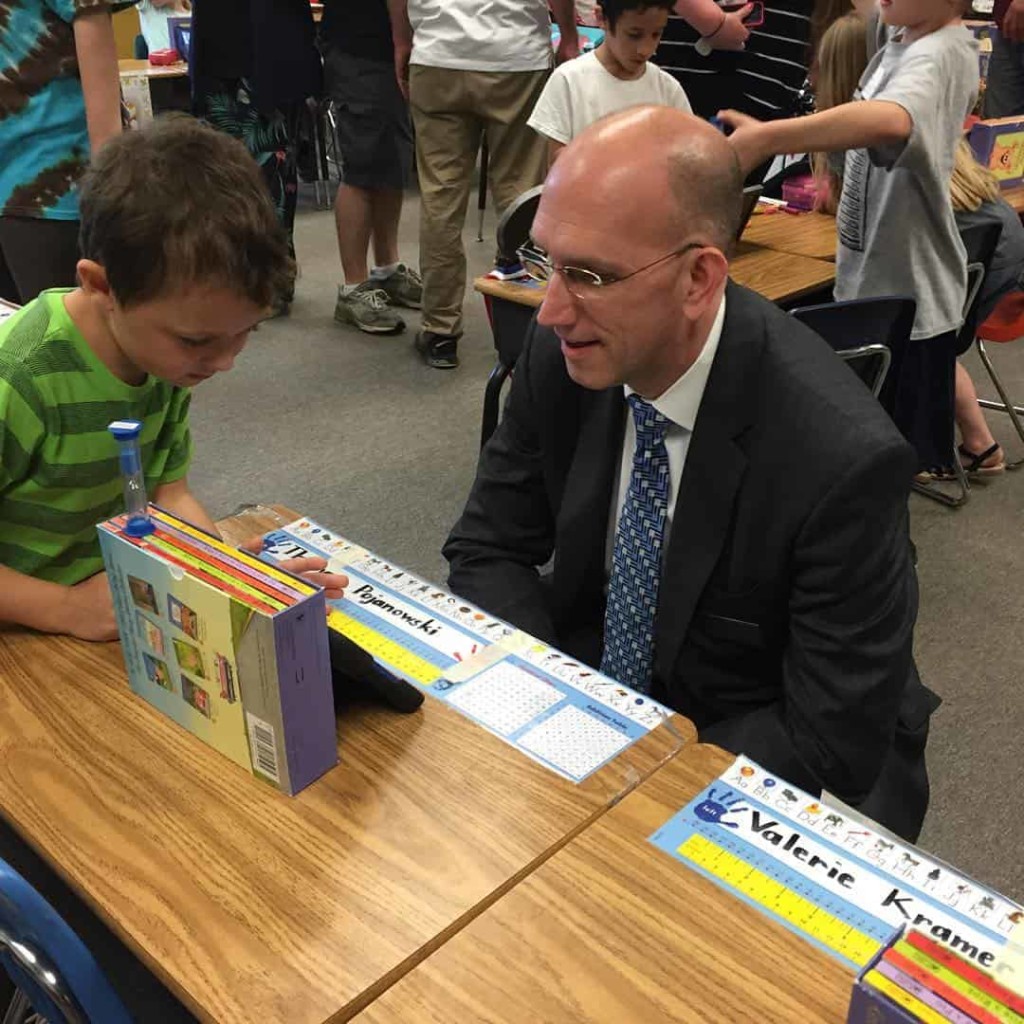Randy Ziegenfuss on Teacher Leadership and Student-Centered Learning

If you follow education social media, you’ve probably heard of Salisbury Superintendent Randy Ziegenfuss. Over the last three years, he’s become a leading advocate of learner-centered education. He’s on Facebook, Twitter (@ziegeran) and he blogs. With his assistant superintendent Lynn, Randy has produced more than 40 episodes of the Shift Your Paradigm podcast which explores learner-centered education and leadership.
Salisbury Township sits between Allentown and Bethlehem in the Lehigh Valley of central Pennsylvania. Randy went to high school and college in Bethlehem. He was pretty good at playing school and really good at playing the trumpet. He studied music in college and became a music teacher after graduation.
Ziegenfuss thinks music teachers have a special appreciation for personalized and competency-based learning. “By the nature of the domain it’s very performance oriented,” said Randy
Music teachers also appreciate the benefits of extended challenges, individual practice, and public performances said, Ziegenfuss. “Musicians become expert in areas of passion.”
Randy moved from music to technology and helped Salisbury make the shift from analog to digital. He admitted they were more focused on tech than learning during the shift, “We were focused on tech until we got to 1:1.”
After the shift to digital learning, “Mindsets started to shift,” said Ziegenfuss, “We ask what really is powerful learning?”
Four years ago, Randy became superintendent in Salisbury. Rather than “focus on boards, budgets, and sports fields,” as is common, Ziegenfuss set out to put “teaching and learning at the core of what we do.”
Randy launched a community conversation to develop the Salisbury portrait of a graduate. Then they began considering what learning experiences and environments would get students there. With a clear definition of what graduates should know and be able to do, the Salisbury team found and adopted the elements of learner-centered education from Education Reimagined: learner agency; personalized, relevant and contextualized; socially embedded; open walled; and competency-based.
| THE PURPOSE OF A SALISBURY EDUCATION is to enable all learners to fulfill their full potential as empowered individuals, constructive members of the Salisbury community, productive participants in a changing economy, and engaged citizens of the United States and the world. |
| COMPETENCY-BASED learning is when the learner works toward competency and strives for mastery in defined domains of knowledge/literacies, skills, and dispositions. |
|
| PERSONALIZED, RELEVANT, AND CONTEXTUALIZED learning is an approach that uses such factors as the learner’s own passions, strengths, needs, family, culture, and community as fuel for the development of knowledge, skills, and dispositions. |
|
| Learning that is characterized by LEARNER AGENCY recognizes learners as active participants in their own learning and engages them in the design of their experiences and the realization of their learning outcomes in ways appropriate for their developmental level. |
|
| SOCIALLY EMBEDDED learning is rooted in meaningful relationships with family, peers, qualified adults, and community members and is grounded in community and social interaction. |
|
| OPEN-WALLED learning acknowledges that learning happens at many times and in many places and intentionally leverages its expansive nature in the learner’s development of competencies. |
|
“Getting to know kids, what are they curious about, and connecting to student passion–these things line up with elements of Education Reimagined.”
In the early stages of transformation, Ziegenfuss recognizes that “context is important” and “each school has unique strengths and personalities.” Salisbury schools have the agency to create a focus and organize their own work.
“Two years ago the change process started with pockets of teachers that had the propensity to give it a go,” said Ziegenfuss. “We gave them license to experiment.”
“You can’t force a mindset change, you create conditions where people come to it in their time,” added Ziegenfuss.
Change is starting around the edges. Salisbury high school is experimenting with student internships captured on media. A half-day middle school pilot is experimenting with new forms of feedback and harnessing student (and parent) interest.
Ziegenfuss is trying to create space for principals to develop their own understanding. They visit and study other schools to learn what they can. “The process takes time,” said Randy, “It can’t come top down.”
While he may not be pushing top-down change, Randy’s advocacy asks us all to reconsider education and ways it could become more learner-centered.
Key Takeaways from the Podcast
[:16] About this week’s guest, Randy Ziegenfuss.
[1:06] About Randy’s early education.
[4:11] Does Randy think that music teachers have a special appreciation for personalized and competency-based learning? And that every learner is on a different journey?
[8:43] How being a band director teaches you humility.
[10:48] How Randy moved from his position teaching music, to teaching technology, to becoming Superintendent.
[15:17] About next week’s iNACOL Party in Nashville. Email [email protected] to get your name on the list!
[15:36] Randy speaks about the analog-to-digital learning shift in education and how it has helped to provide perspective on the current shift from school-centered to student-centered.
[19:26] When student-centered learning really clicked for Randy.
[21:13] Did Randy adopt Education Reimagined’s student-centered learning principles as part of his strategic plan at Salisbury?
[23:55] Randy’s journey at Salisbury and his progress in shifting the schools to more student-based learning.
[31:44] How Randy’s framework is helping to shift the mindsets and allow time for reflection.
[33:25] Randy’s thoughts on the tension between innovation and equity (when progress is happening at different speeds in the district).
[35:35] About Randy’s podcast, Shift Your Paradigm, and what he’s trying to accomplish with it.
[41:37] Looking forward, what is Randy most curious about in transforming education?
[44:22] Parting words and thanks from Tom and Randy.
Mentioned in This Episode
Randy’s Twitter
Randy’s LinkedIn
WorkingAtTheEdge.Org
Shift Your Paradigm Podcast
Lynn Fuini-Hetten’s Twitter (Randy’s podcast co-host)
Social Good Summit
Johns Hopkins University
Education Reimagined
Pioneering Newsletter
Listening to Kids and Designing from Scratch for Timeless Learning (Pam Moran podcast)
For more, see:
- The Promise & Challenge of Student-Centered Learning
- Learner-Driven Communities
- On Becoming Student-Centered and Mastery-Based
- School’s Out: What If Schools, As We Know Them Didn’t Exist
Stay in-the-know with all things EdTech and innovations in learning by signing up to receive the weekly Smart Update.





0 Comments
Leave a Comment
Your email address will not be published. All fields are required.